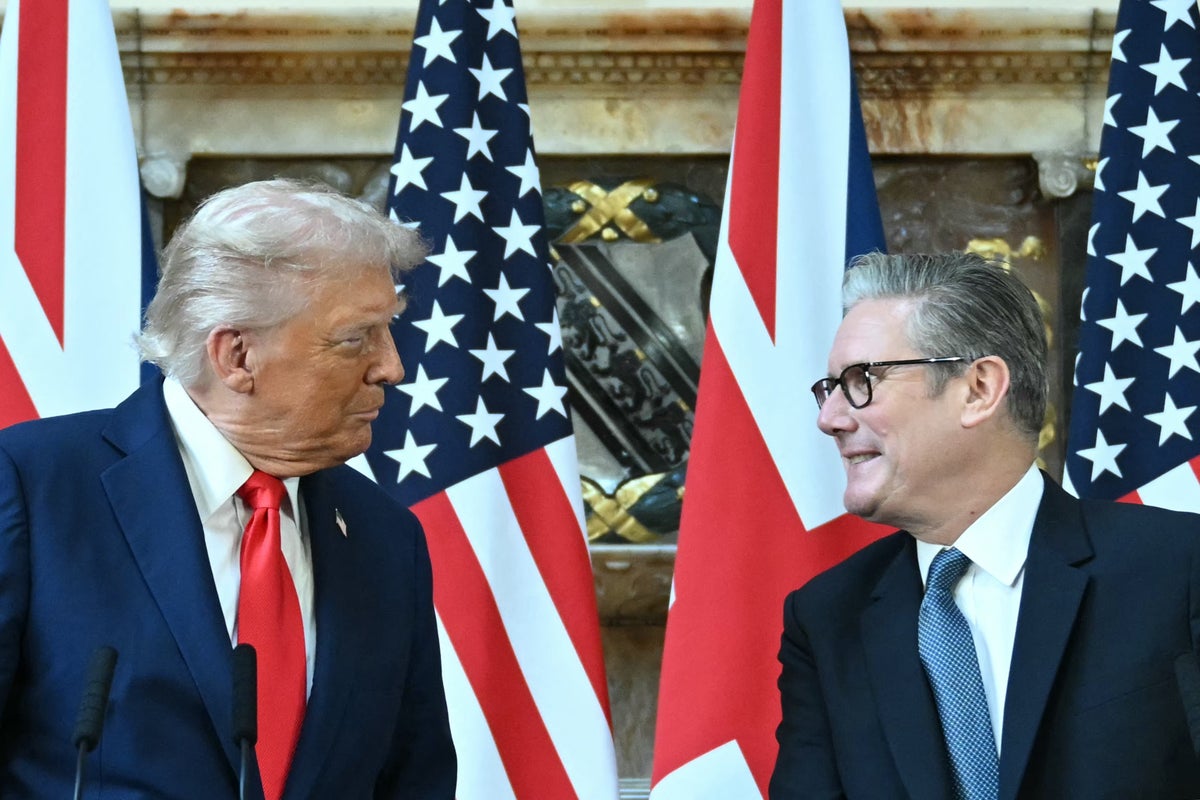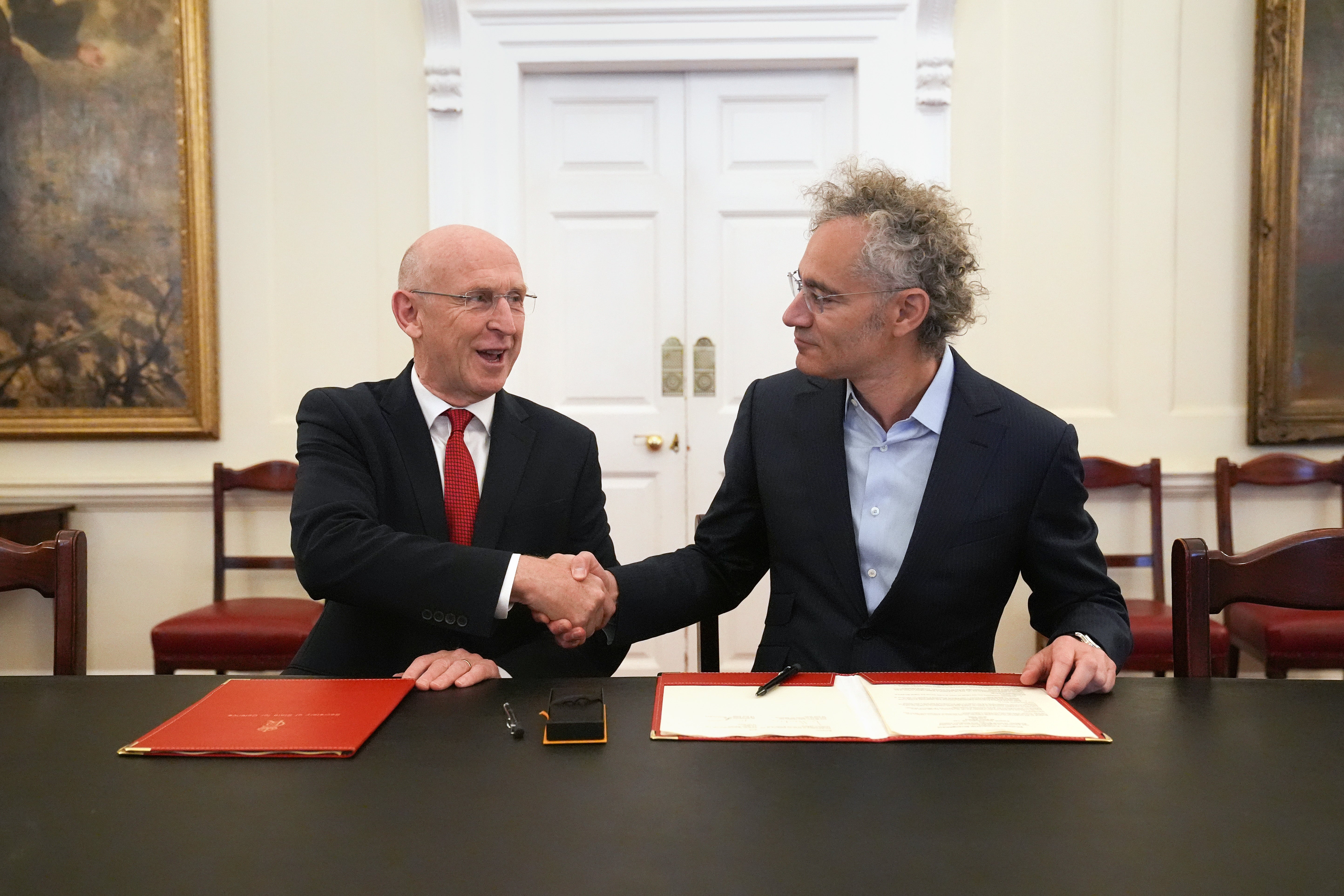Business
The British business winners and losers after US £150bn investment pledge

Donald Trump’s UK state visit coincided with an announcement that US firms will invest round £150 billion into the UK.
The trip comes amid a key period for global trade, after the US president’s tariff plans led to significant trade tensions earlier this year.
Firms in some sectors have announced fresh commitments to pump billions into the UK, in a potential boost for Chancellor Rachel Reeves.
However, some industries criticised a lack of trade deal support and tough investment conditions in the UK.
So, which sectors have been winners and losers this week:
Winners
Tech
Technology firms have been at the forefront of the major investment deals into the UK.
On Wednesday, Prime Minister Sir Keir Starmer and Mr Trump announced a “tech prosperity deal” will see the UK and US co-operate in areas including artificial intelligence (AI), quantum computing and nuclear power.
America’s top technology companies announced £31 billion of investment alongside the announcement.
These included a commitment by Microsoft to invest £22 billion in the UK to fund an expansion of Britain’s AI infrastructure and the construction of the country’s largest AI supercomputer.
Nvidia boss Jensen Huang hailed a “big week for AI in the UK” as the US chip giant committed to supporting the development of the supercomputer.
The firm agreed to deploy 120,000 advanced processors across the UK to help improve infrastructure across the British AI sector.
Google committed £5 billion of investment, focusing on improvements in research and development and AI infrastructure.
There was also a raft of smaller investments by tech companies including AI cloud computing company CoreWeave, Salesforce and AI Pathfinder.
Defence
US software company Palantir announced plans to invest £1.5 billion in the UK’s defence sector, with funding going into the development of artificial intelligence-powered capabilities to speed up decision making, military planning and targeting.
Defence Secretary John Healey said the investment was a “major vote of confidence” for the UK.
Palantir said it plans to establish the UK as its European headquarters for defence, creating 350 “high-skilled” new jobs.

Manufacturing and R&D
There were a number of investments such as £3.9 billion from Prologis to drive growth in life sciences and advanced manufacturing.
US engineering firm Stax committed £37 million to expand its operations and pioneer emission-reducing technology used at ports.
Infrastructure
Private equity giant Blackstone said it plans to invest around £100 billion into assets in the UK over the next decade, in the single largest investment commitment.
This includes £10 billion of previously announced investment into its UK data centres.
Nuclear engineering company Amentum confirmed a £150 million investment in the UK and said it plans to create more than 3,000 new jobs, to increase its UK workforce by over 50 per cent over the next four years.
X-Energy and Centrica also said they plan to build up to 12 advanced modular reactors.
Losers
Steel
The steel industry was among the main sectors left disappointed by the president’s visit.
Plans for US tariffs on UK steel exports to be scrapped have been shelved, with the UK pausing its push to bring the levy down to zero.
UK steel exports to the US currently face a 25 per cent tariff, compared with 50 per cent for other nations.
Earlier this year, the UK and the US agreed for some UK steel to be exempt from tariffs.
Gareth Stace, director-general of industry trade association UK Steel, said it was “disappointing”.
Pharmaceuticals
As part of investments between the countries, UK pharmaceutical giant GSK revealed plans to put nearly £22 billion into US R&D and manufacturing over the next five years.
The government said the deal will “strengthen UK-US life sciences ties” but it comes amid a challenging backdrop for investment for the sector in the UK.
Last week, US-based Merck said its UK operation will scrap plans for a £1 billion site in Kings Cross, which had been due to open in 2027.
Bosses blamed the government for paying too little for medicines and not investing enough in the sector, as it confirmed the move, which will impact around 125 jobs.
Days later, AstraZeneca announced it had paused plans to invest £200 million at a Cambridge research site in the latest major blow for the sector.
Industry bosses told MPs this week that the “difficult” environment in the UK and pressure on pricing had made the UK a less attractive investment environment than other countries such as the US.
Mr Trump told reporters on Thursday that pharmaceutical firms were coming back to the US from other countries.
“Car companies are moving in, AI is moving in, everybody’s coming in… The drug companies are coming back, they all want to be there – they sort of have to be there – but they all want to be there.”
Business
Ministers asked to take G Ram G to rural India – The Times of India

NDA functionaries, including ministers, would soon hit the ground to explain and create more awareness about benefits of the new rural employment guarantee scheme VB G-RAM-G, which has replaced the UPA-era MNREGA, to negate the opposition’s narrative. This was discussed at Friday’s Cabinet meeting, which PM Modi chaired soon after his foreign trip, sources said.TOI has learnt rural development and agriculture minister Shivraj Singh Chouhan briefed the key provisions of the new scheme to all ministers while urging them to take the message to people. Sources said the PM was also of the similar view for creating more awareness about the new law. Opposition parties may soon carry out protests against the new scheme, particularly for dropping the name of Mahatma Gandhi and increasing burden on the state govts.
Business
Mitsubishi announces $4.4bn Shriram deal – The Times of India

New Delhi: Japan’s Mitsubishi UFJ Financial Group (MUFG) will acquire a 20 per cent in non-bank finance company Shriram Finance (SFL) for $4.4 billion (Rs 39,618 crore), in what is the largest foreign direct investment in the country’s financial services space. MUFG will pick up the minority stake through preferential equity shares, Shriram Finance said in a statement.The Indian financial services outfit will issue 47.1 crore shares at Rs 840.9 each to MUFG Bank through a preferential allotment, it said in a stock exchange filing. MUFG will be able to nominate two directors on the board of Shriram Finance (SFL). The investor will also have a pre-emptive right to subscribe to pro rata shareholding. “These rights shall fall away if the shareholding of the investor in the company falls below 10 per cent on a fully diluted basis,” a press release said. In its edition on Wednesday, TOI had reported about the proposed transaction. “This collaboration combines SFL’s established domestic franchise and extensive distribution network with MUFG Banks’ global expertise and financial strength. The fund infusion will significantly enhance SFL’s capital adequacy, strengthen its balance sheet, and provide long-term growth capital. It will improve access to low-cost liabilities and potentially strengthen SFL’s credit ratings while aligning governance and operational practices with global best standards,” the NBFC said in a statement.
Business
ADB reviews progress on ML-I rail upgradation | The Express Tribune

Ground-breaking of Karachi-Rohri section set for July 2026; upgradation of ML-I urged
The Railways Division submitted the ML-I project summary to ECNEC without arranging finances from the Public Sector Development Programme, China, or any other international financial institution. Photo: AFP
ISLAMABAD:
A delegation of the Asian Development Bank (ADB), led by Director General Leah Gutierrez, on Friday called on Federal Minister for Railways Muhammad Hanif Abbasi to review progress on the upgradation of Main Line-I (ML-I), Pakistan Railways’ most critical infrastructure project.
During the meeting, detailed discussions were held on the scope, financing and implementation strategy of the ML-I upgradation, according to a news release.
Officials briefed the meeting that ML-I serves as the backbone of Pakistan Railways, facilitating nearly 80% of passenger traffic and around 90% of freight movement across the country.
In view of the current condition of railway infrastructure, participants underscored the urgent need to upgrade ML-I to ensure safe, efficient and reliable rail operations.
The project is expected to significantly enhance connectivity, reduce travel time and strengthen Pakistan’s logistics and trade capacity.
Hanif Abbasi described ML-I as a key project for the national economy, saying its modernisation would play a vital role in promoting economic growth, improving regional connectivity and ensuring sustainable transport.
The ADB delegation reaffirmed its continued cooperation and confidence in the progress of the ML-I project and expressed its commitment to supporting Pakistan Railways in its reform and modernisation efforts.
Both sides also agreed that the ground-breaking ceremony of the ML-I Karachi-to-Rohri section would be held in July 2026, marking a major milestone in the execution of the project.
-

 Business6 days ago
Business6 days agoHitting The ‘High Notes’ In Ties: Nepal Set To Lift Ban On Indian Bills Above ₹100
-

 Politics1 week ago
Politics1 week agoTrump launches gold card programme for expedited visas with a $1m price tag
-

 Fashion1 week ago
Fashion1 week agoTommy Hilfiger appoints Sergio Pérez as global menswear ambassador
-

 Sports4 days ago
Sports4 days agoJets defensive lineman rips NFL officials after ejection vs Jaguars
-

 Business5 days ago
Business5 days agoKSE-100 index gains 876 points amid cut in policy rate | The Express Tribune
-

 Tech6 days ago
Tech6 days agoFor the First Time, AI Analyzes Language as Well as a Human Expert
-

 Business5 days ago
Business5 days agoStudying Abroad Is Costly, But Not Impossible: Experts On Smarter Financial Planning
-

 Business1 week ago
Business1 week agoIPO Explained: Meaning, Process, Benefits, Risks





